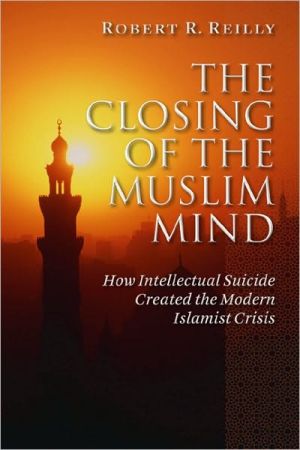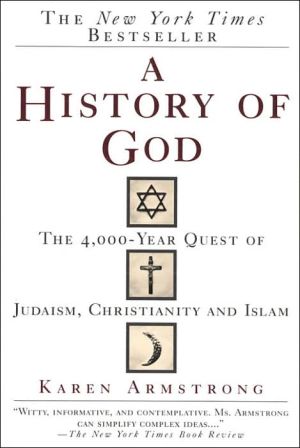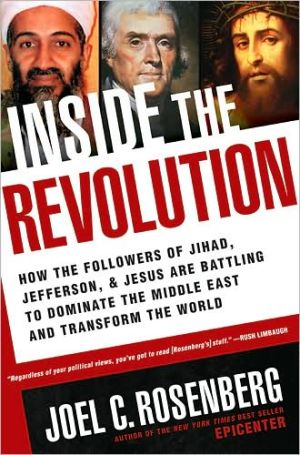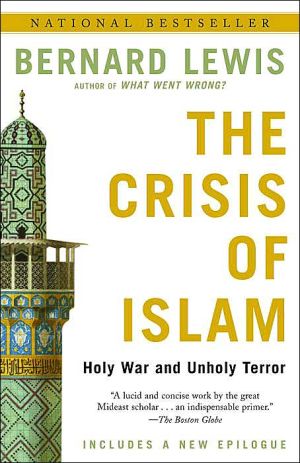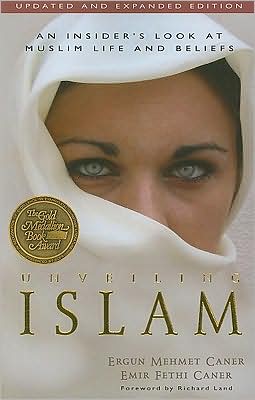The Closing of the Muslim Mind: How Intellectual Suicide Created the Modern Islamist
Islam’s Intellectual Suicide—and the Threat to Us All\ \ People are shocked and frightened by the behavior coming out the Islamic world—not only because it is violent, but also because it is seemingly inexplicable. While there are many answers to the question of “what went wrong” in the Muslim world, no one has decisively answered why it went wrong. Until now.\ In this eye-opening new book, foreign policy expert Robert R. Reilly uncovers the root of our contemporary crisis: a pivotal...
Search in google:
Islam’s Intellectual Suicide—and the Threat to Us All People are shocked and frightened by the behavior coming out the Islamic world—not only because it is violent, but also because it is seemingly inexplicable. While there are many answers to the question of “what went wrong” in the Muslim world, no one has decisively answered why it went wrong. Until now.In this eye-opening new book, foreign policy expert Robert R. Reilly uncovers the root of our contemporary crisis: a pivotal struggle waged within the Muslim world nearly a millennium ago. In a heated battle over the role of reason, the side of irrationality won. The deformed theology that resulted, Reilly reveals, produced the spiritual pathology of Islamism, and a deeply dysfunctional culture.Terrorism—from 9/11, to London, Madrid, and Mumbai, to the Christmas 2009 attempted airline bombing—is the most obvious manifestation of this crisis. But Reilly shows that the pathology extends much further. The Closing of the Muslim Mind solves such puzzles as: · why peace is so elusive in the Middle East· why the Arab world stands near the bottom of every measure of human development· why scientific inquiry is nearly dead in the Islamic world· why Spain translates more books in a single year than the entire Arab world has in the past thousand years· why some people in Saudi Arabia still refuse to believe man has been to the moon· why Muslim media frequently present natural disasters like Hurricane Katrina as God’s direct retribution Delving deeper than previous polemics and simplistic analyses, The Closing of the Muslim Mind provides the answers the West has so desperately needed in confronting the Islamist crisis.WHAT THEY ARE SAYING"The lack of liberty within Islam is a huge problem. Robert Reilly’s The Closing of the Muslim Mind shows that a millennium ago Muslims debated whether minds should be free to explore the world—and freedom lost. The intellectual history he offers helps to explain why Muslim countries fell behind Christian-based ones in scientific inquiry, economic development, and technology. Reilly provides astonishing statistics . . . [and] also points out how theology prefigures politics." —World Magazine "As Robert R. Reilly points out in The Closing of the Muslim Mind . . . the Islamic conception of God as pure will, unbound by reason and unknowable through the visible world, rendered any search for cause and effect in nature irrelevant to Muslim societies over centuries, resulting in slipshod, dependent cultures. Reilly notes, for example, that Pakistan, a nation which views science as automatically impious given its view that an arbitrary God did not imprint upon nature a rational order worth investigating, produces almost no patents." —American Spectator
The Closing of the Muslim Mind\ How Intellectual Suicide Created the Modern Islamist Crisis \ \ By Robert R. Reilly \ ISI BOOKS\ Copyright © 2010 Robert R. Reilly\ All right reserved.\ ISBN: 978-1-933859-91-0 \ \ \ Chapter One\ The Opening: Islam Discovers Hellenic Thought \ One cannot address the closing of the Muslim mind unless one is aware of its opening. And concomitantly, one must know what it initially opened from and on to.\ The opening should be seen against the background of pre-Islamic Arabia, a typical tribal society, immersed in polytheism (though a supreme deity, Allah, was vaguely acknowledged), pantheism, animism, fetishism, and superstition. The Ka'ba in Mecca contained a pantheon of some 360 tribal gods and goddesses in its precincts. Trading and raiding (razzias) were the principal livelihoods. As is typical of tribal societies, conflict was the norm-within certain traditional limits, such as the prohibition against fighting during the four "sacred months." Force defined the status of relations between tribes, which were themselves defined by family or blood. Strength ruled with the sanction of custom. Arabia had some familiarity with Judaism (with a few resident Jewish tribes) and Christianity, but was thoroughly pagan.\ Philosophy in the form of Greek thought had not penetrated the peninsula. At least, there seems to be no evidence of its having done so. Under this multiplicity of gods and without philosophy, it would not naturally have occurred to the warring tribes that they had something in common that was more important than themselves-that the differences among them, defined by bloodlines and different gods, could be superseded by a higher good. Monotheism was that higher good, as propounded by Muhammad starting around A.D. 610. The unity of Islam, based upon tawhid-the unity or unicity of Allah-stopped the near-constant tribal raiding through its teaching of profound equality among Muslims. Fellow Muslims became sacrosanct. As the Qur'an enjoined, "Hold fast, all of you together, to Allah's rope, and do not separate. Remember Allah's beneficence to you, for you were enemies but He composed your hearts so that by His favour you have become brothers" (3:103).\ At the same time, Islam divinely sanctioned a kind of mega-tribal raiding of the rest of the non-Muslim world. "Allah has promised you much booty that you will take [in the future] ... and other booty, over which ye have not yet had power: but God compassed them for you" (Qur'an 48:20-21). According to this new revelation, it was now only right and just that non-Muslims should be subdued and ruled by the true followers of God. How to conduct these raids and divide the booty from them is an important part of the Qur'an (Qur'an 8: The Spoils; 59:6 The Mustering). The first biographies of Muhammad were titled kitab al-meghazi, the Book of Raids.\ The early conquests were staggeringly successful and seemed to confirm the Qur'an's claims. By A.D. 650, Muslims ruled Arabia, Iraq, Syria, Lebanon, Palestine, and Egypt. Less than a century later, Islam spread from the fringes of China and India in the East to North Africa and Spain in the West. Early Islam's energies were spent in absorbing its mandated conquests and in defining its creed, which was held to be superior to any earlier revelation of any other religion (Qur'an 9:33). Thus Islam was naturally suspicious of anything outside of itself. The Qur'an, it was thought, contained everything needed, and non-Qur'anic things were either against it or superfluous. The great fourteenth-century historian Ibn Khaldun wrote that, when the Muslims conquered Persia, general Sa'd bin Abi Waqqas petitioned Caliph Omar for permission to distribute the huge quantity of captured books and scientific papers as booty. Caliph Omar wrote back: "Throw them in the water. If what they contain is right guidance, God has given us better guidance. If it is error, God has protected us against it."\ This intellectual quarantine could not, however, be maintained outside of Islam's peninsular homeland. In the conquered Sassanid and Byzantine territories, Islam encountered civilizations superior to itself by any measure. When the capital of the Islamic empire moved from Medina to Damascus under the Umayyad dynasty (660-750), the Muslim rulers were surrounded by an alien culture. How should Islam react to what it now ruled? How much could it absorb and what should it reject, and why? What should its attitude be toward the beliefs and teachings of those whom it had conquered?\ The First Encounter\ Islam encountered Greek thought in its new Byzantine and Sassanid possessions. Exactly how these early Hellenic influences reached into Islam is a matter of some conjecture. What is clear is that huge areas of what had been the Byzantine Empire were largely Christian, and in them Greek philosophical notions had long been employed in Christian apologetics. There were also centers of Hellenistic learning in Alexandria (which moved to Antioch, Syria, around A.D. 718) and Gondeshakpur, northeast of Basra, Iraq. The latter had been maintained by the Sassanids, who had employed mainly Christian (Nestorian) teachers. The body of what were called "the intellectual sciences" included logic and philosophy, as well as the natural, medical, engineering, and mathematical sciences. A good deal of Greek philosophical and scientific treatises had been translated into Syriac by Christian scholars. As these subjects were not familiar to Arab culture, the Arabs dubbed them "intruding sciences." The initial Muslim interest in the Greek sciences was in practical matters such as medicine, mathematics, natural science, alchemy, and astrology.\ Most learned men in these sciences, however, were also schooled in philosophy and theology, which meant that Muslim interest began to spill over into philosophical and theological issues. Muslims were also called upon to defend and advance their faith against Christians and others who used philosophical methods in their apologetics. Some Muslim converts in these new territories were already versed in Greek learning and prepared to deploy it on behalf of their new faith. Thus, by the late eighth and early ninth centuries, a new kind of discourse began to affect Islamic thought that had hitherto been largely doctrinal and jurisprudential. New words were created in Arabic to take in Greek concepts. Philosophy opened the Muslim mind in a way in which it had never been before in the spirit of free inquiry and speculative thought. It is at this juncture that the greatest intellectual drama of Islam took place.\ After Islam encountered Hellenic thought, the most challenging issue it faced involved the status of reason. What is reason's ability to apprehend reality? Can God be known rationally? How does the voice of reason comport with the claims of revelation as contained in the Qur'an? Does reason precede faith? Is revelation addressed to reason? Can reason comprehend moral principles outside of the Qur'an? What if something in the Qur'an appears to be unreasonable? Is it legitimate even to ask these questions? Is Islam compatible with anything other than itself? Was it capable of assimilating philosophy? If so, on what grounds?\ A pitched battle took place over the answers to these questions, most particularly during the ninth and tenth centuries of the Abbasid caliphate. At stake were man's free will, his ability to know through his reason, and the very nature of reality and of God. At the conclusion of this battle, the triumphant side gradually extirpated philosophy and dehellenized the Muslim world. This did not take place without a fight from those Muslim thinkers and their followers who precipitated the opening. In many ways, the struggle continues today.\ The First Struggle: Qadar (Man's Power to Act) versus Jabr (Fate/Compulsion)\ The side in this emerging debate most easily recognizable to a Westerner was the Mu'tazilite school, composed of the Muslim rationalist theologians who fought for the primacy of reason. Their appearance in the late eighth and early ninth centuries should be seen in the context of a preceding dispute within Islam about predestination and free will. This issue was, in fact, the source of the earliest theological debate in Islam. Some scholars say this dispute was completely native to Islam, while others, such as Duncan Macdonald, aver that "it is impossible to mistake the workings of the dialectic refinements of Greek theology as developed in the Byzantine and Syrian schools." The pre-Mu'tazilites were called Qadarites, or Qadariyya, after the Arabic word qadar, which can mean divine decree or predestination, or power. They stood for the opposite of predestination: man's free will and consequent responsibility for his actions. Man has power (qadar) over his own actions. If men were not able to control their behavior, said the Qadarites, the moral obligation to do good and avoid evil, enjoined by the Qur'an, would be meaningless.\ Contrary to this view, the Jabariyya (determinists; from jabr, meaning blind compulsion) embraced the doctrine that divine omnipotence requires the absolute determination of man's actions by God. One of the names of God in the Qur'an is al-Jabbar, the Compeller (59:23), whose power cannot be resisted. God alone authors man's every movement. To say otherwise ties God's hands and limits his absolute freedom. One of the exponents of this view, Jahm bin Safwan (d. 745), argued that man's actions are imputed to him only in the same way as one imputes "the bearing of fruit to the tree, flowing to the stream, motion to the stone, rising or setting to the sun-blooming and vegetating to the earth." As Fazlur Rahman summed up the dispute, "In the eyes of the orthodox, this freedom for man was bondage for God."\ As in the case of other theological issues within Islam, the Qur'an offers support for both positions. The disputants could each quote verses supporting their respective sides. British Islamic historian Alfred Guillaume claims, however, that things appear to favor the Jabariyya side, especially when the Hadith are considered. (The Hadith are the "traditions" that report various sayings and actions of Muhammad, which were first passed on orally before being written down in collections, six of which are accepted as genuine sources of revelation.) Guillaume states that "the orthodox party had the Qur'an on their side when they asserted that God's predestination was absolute. This view is borne out by the chapter on predestination in the books of canonical tradition which do not contain a single saying of Muhammad's which leaves freedom of action to man. Everything is predestined from the first and a man's fate is fixed before he is born."\ Here are several examples of such Hadith:\ Hudhayfa bin Asid reported that the Prophet said, "Two angels visit every foetus in the womb upon the completion of forty or forty-five nights and say, 'O Lord! Is it misguided or righteous?' Then they write [the answer]. Then they ask, 'O lord! Is it male or female?' Then they write [the answer]. They also write its deed, wealth and means of livelihood, and death. Then they roll off the parchment to which nothing is added nor detracted afterwards."\ Abu Huraira reported Muhammad as saying: "Verily Allah has fixed the very portion of adultery which a man will indulge in and which he of necessity must commit."\ A Hadith found in both Muslim and al-Bukhari (the two most authoritative sources of Hadith) has Moses, upon meeting Adam, asking him: "Are you the Adam, the father of all humanity, whom He created with His own hand.... Why did you get us and yourself expelled from the garden?" To this Adam replies, "Are you the Moses whom God chose for His messengership, distinguished him by speaking to him and wrote the Torah for him with His own hand? How long before my creation did you find the words pre-written: 'Adam disobeyed His order and went astray (Qu'ran 20:121)?'" Moses then answers: "This was [pre-written] so much time before [your creation]." Thus does Adam confound Moses.\ A Qur'anic verse supporting this orientation says: "So whoever Allah wants to guide-He expands his breast to [contain] Islam; and whoever He wants to misguide-He makes his breast tight and constricted as though he were climbing into the sky" (6:125). And "When you shot it was not you who shot but God" (8:17).\ Counterpoised to these are other citations from the Qur'an that seem to confirm the Qadarite position and make clear that man can choose freely and will be held accountable on judgment day. For example, the Qadarites could quote: "Whosoever does an evil deed shall be recompensed only with the like of it, but whosoever does a righteous deed, be it male or female, believing shall enter Paradise, therein provided without reckoning" (40:40). Or, "Say, 'The Truth is from your Lord.' Let him who will, believe; and let him who will reject [it]" (18:29). Or, "Each soul earns but its own due" (6:164). Also: "And Allah created the heavens and the earth with truth, so that each soul might be recompensed according to what it has earned, with no one wronged" (45:22). There are many such verses that refer to man's responsibility and accountability for his actions.\ The conundrum created by these two conflicting positions seems to be contained within the same Qur'anic citation: "If Allah so willed, he could make you all one people. But He leaves straying whom He pleases, and He guides whom He pleases and you shall certainly be called to account for all your actions" (16:93).\ The Qur'an's ambiguity allowed room for this dispute and for political maneuver and advantage from it. Both the Qadarite and the Jabrite views had profound political implications. The Umayyad caliphs ruling in Damascus enjoyed the sanction provided by the Jabariyya doctrine because it excused them from responsibility for any unjust acts. How could they be blamed for their foreordained brutality? As such, out of piety, their subjects should accept, or at least ignore, their misdeeds (which included an attack on the Ka'ba). In order to secure his power, Umayyad Caliph 'Abd al-Malik brought one of his rivals, 'Amr ibn Sa'id, into the palace under false pretenses, beheaded him, and then had his head tossed to his awaiting crowd of supporters with the announcement that "the Commander of the Faithful has killed your leader, as it was foreordained in God's inalterable decree." The erstwhile supporters of Ibn Sa'id then paid obeisance to the caliph.\ Not all, however, were willing to abide by this interpretation. Hassan al-Basri (d. 728) was asked his opinion of "those kings [the Umayyad caliphs] who spill the blood of Muslims, appropriate their possessions, do what they please and say, 'Our actions are indeed part of God's fore-ordination.'" Al-Basri, whose student, Wasil ibn 'Ata (d. 748), founded the Mu'tazilite school, answered: "The enemies of God lie." Allah, he said, quoting the Qur'an, was "no unjust dealer with His servants." Allah is not the source of evil; men are-in their evil actions. This theological position was taken as a political attack. Two Qadarite theologians, Ma'bad al-Juhani (d. 699) and Ghailan al-Dimashqi (d. before 743), were executed by the Umayyads for their defense of free will, which was considered subversive and a direct challenge to the Umayyad theological rationalization of its atrocities.\ In 750, the Abbasids overthrew the Umayyads, along with their doctrine of predestination. The Abbasids had cause to embrace the Mu'tazilites, who succeeded to the Qadariyya position. The Mu'tazilites agreed with the Qadariyya that, without man's freedom, God's justice is unintelligible. To be held justly accountable for his acts, man must be free. The political implications of this position favored the Abbasid attempt to rein in the power of the ulema (Islamic jurisprudential scholars), whose monopoly on the interpretation of the Qur'an gave them great influence. When he acceded to the throne, al-Ma'mun took the title of imam, and chose a Shi'a as his successor. These actions clearly implied a claim on his part that he also had the authority to interpret Islamic scripture, and perhaps even to amend it. The Mu'tazilite teaching that the freedom of man also meant the freedom to interpret sacred texts reinforced this claim from another direction.\ The freedom to interpret revelation was based upon the Mu'tazilite teaching, shocking to the traditionalists, that the Qur'an was created in time. The standard orthodox belief was that the Qur'an is uncreated and exits coeternally with Allah. If the Qur'an was created, it is subject to rational criteria. If it is subject to rational criteria, it is not the exclusive domain of the ulema. An uncreated Qur'an would not allow for this interpretive freedom. Caliph al-Ma'mun knew that the teaching of a created Qur'an and of man's free will would enhance his authority and undermine that of the traditionalist ulema. Therefore, he sponsored the Mu'tazilites. He also genuinely embraced their views because he was fascinated by philosophy.\ (Continues...)\ \ \ \ \ Excerpted from The Closing of the Muslim Mind by Robert R. Reilly Copyright © 2010 by Robert R. Reilly. Excerpted by permission.\ All rights reserved. No part of this excerpt may be reproduced or reprinted without permission in writing from the publisher.\ Excerpts are provided by Dial-A-Book Inc. solely for the personal use of visitors to this web site. \ \
Contents Foreword by Roger Scruton....................ixIntroduction Intellectual Suicide....................1Chapter 1 The Opening: Islam Discovers Hellenic Thought....................11Chapter 2 The Overthrow of the Mu'tazilites: The Closing Commences....................41Chapter 3 The Metaphysics of the Will....................59Chapter 4 The Triumph of Ash'arism....................91Chapter 5 The Unfortunate Victory of al-Ghazali and the Dehellenization of Islam....................119Chapter 6 Decline and Consequences....................127Chapter 7 The Wreckage: Muslim Testimonials....................157Chapter 8 The Sources of Islamism....................173Chapter 9 The Crisis....................197Notes....................207Further Reading....................229Acknowledgments....................233Index....................235
